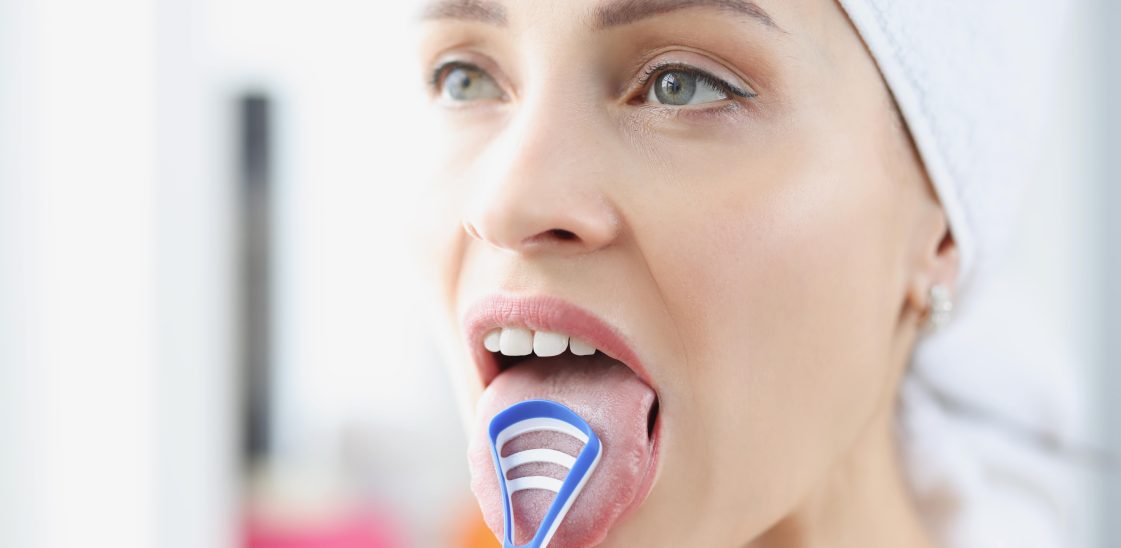
Are tongue scrapers safe?
The tongue is an often overlooked area of the mouth when it comes to oral hygiene. The basics of dental hygiene are well known – brush your teeth, floss or use interdental brushes, use mouthwash, don’t eat lots of sugar.[1] However, none of these principles directly tackle a part of your mouth that sees as much usage, if not more, as your teeth: the tongue.
Tongue scrapers aim to plug the gap in your oral hygiene routine, allowing you to properly and thoroughly clean your tongue. However, there are a wealth of misconceptions about the safety and effectiveness of these handy tools.
Are tongue scrapers bad for you?
Many people think tongue scrapers are bad for you or, at the very least, aren’t good for you. Some people are of the opinion that there’s no need to have a dedicated tool for tongue scraping when a toothbrush or a spoon can do the job. This is inaccurate. While a toothbrush or a spoon can remove bacteria and food particles from your tongue, they’re not thought to be as efficient as a purpose built tongue scraper.
Tongue scrapers like the Orabrush tongue cleaner can remove more bacteria than a toothbrush or other tool, which can help to freshen the mouth and prevent the build up of bacteria leading to bad breath, cavities and other dental hygiene issues. As much as 90% of bad breath can originate on the tongue, so it’s well worth going the extra mile to keep it clean. While tongue scrapers can’t prevent bad breath for good, consistent usage twice daily can freshen the breath for a short period of time.
Additionally, tongue scrapers can help to improve the appearance of your tongue. Over time, a white coating made up of food particles and bacteria can form on your tongue, which may also increase bad breath. Tongue scrapers can remove this build up and help to prevent it from forming again, giving your tongue a more pink and appealing appearance.[2]
Do tongue scrapers hurt?
Used correctly, tongue scrapers shouldn’t hurt your mouth. You may experience some discomfort and your gag reflex may be triggered often while you grow accustomed to scraping your tongue, but pain is unusual. If you do find tongue scraping painful, it’s best to speak to your dentist about what could cause that pain, as you may have an underlying condition.
Can tongue scrapers damage taste buds?
As well as helping us to talk and move food around our mouth, one of the main purposes of a tongue is to taste. It’s understandable to be concerned that a tongue scraper might damage your taste buds. However, gentle, non-vigorous brushing shouldn’t be at all damaging to your mouth or tongue. In fact, there is evidence to suggest that tongue scraping can improve your sense of taste, perhaps as a result of removing the build up of material that can turn the tongue white.[2]
How to use a tongue scraper without gagging
When you use a tongue scraper, the general advice is to start at the back of your tongue and scrape forwards. However, this can be difficult if you have a sensitive gag reflex or aren’t used to tongue scraping. One thing you can try is to start further forwards, such as at the middle of your tongue, and scrape from there. While you won’t get the full benefits of tongue scraping, it’s better than nothing – and as you get used to the sensation you’ll be able to start further back each time.
It may also help your gag reflex to start gentle and gradually increase the pressure you’re applying to your tongue over time. This can help to reduce general discomfort caused by tongue scraping and may help you build the habit of tongue scraping twice a day.
Resources:
[1] https://www.nhs.uk/live-well/healthy-teeth-and-gums/how-to-keep-your-teeth-clean/
[2] https://doi.org/10.1111/j.0303-6979.2004.00507.x Quirynen, M., Avontroodt, P., Soers, C., Zhao, H., Pauwels, M. and Van Steenberghe, D. (2004), Impact of tongue cleansers on microbial load and taste. Journal of Clinical Periodontology, 31: 506-510.




